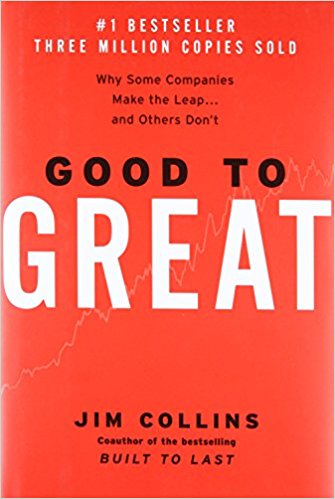What’s standing between you and your wildest, most ambitious goal has less to do with having some kind of magical skill, Elon Musk level of genius, or even talent. It has to do more with how you approach your goals and your problems, and what kind of decisions you make to solve them.
Today, our topic is how to achieve your most ambitious goals! It’s easier than you think!

Good to Great
by Jim Collins
⏱ 14 minutes reading time
🎧 Audio version available
Break It Down to Smaller Parts
One of the most passionate people who address this topic is Stephen Duneier, who went from struggling to pay attention for more than five to ten minutes on a single subject to learning a new language, having an enviably successful career, and learning how to fly a plane.
Once upon a time, the only thing Duneier was consistent at was getting straight Cs for his grades. This is how he, a self-dubbed “undisciplined” person, went on to achieve his most ambitious goals. And how you can too!
Like Duneier, have you ever found yourself unable to settle down and focus on something for more than a few minutes at a time? Here’s how you can overcome this issue. What you have to do is change your approach to things. This is what Stephen calls a “marginal adjustment.”
This marginal adjustment meant that the next time he got an assignment like reading five chapters in a book, he didn’t think of the assignment as five chapters long. He didn’t even think of them as just one chapter.
No, what he started doing was break down the assignment into achievable tasks. All he did was commit to focusing for just five or ten minutes at a time. And when he was done with these five or ten minutes, he would get up and do a task that he enjoyed– even playing video games.
And when he did come back, he didn’t come back to the same assignment. He just committed to doing something productive. According to him, this simple task of taking “really big, ambitious projects that people seem to marvel at, break them down to their simplest form and then just make marginal improvements along the way to improve [his] odds of achieving them” worked miracles.
Remove All Distractions
Want to learn a new language? Write that book you’ve always dreamed about? It’s time to remove all distractions that are stopping you and hindering your progress.
If you’re learning a new language by listening to audio tapes of the lessons, then remove all the music from your phone. This leaves you with just the one option: to listen to the language tapes.
Trying to write a book? Shut down all those extra tabs on your laptop and start typing. Turn off your phone and close the door to avoid having external distractions. Or take it a step further and invest in an old-fashioned typewriter.
Focus on the Process, Not the Outcome
Do you know what was the technique Sir Dave Brailsford used to help the British Cycling team to reach the Olympics in the 2008 Beijing Olympics and win seven out of ten gold medals?
And come back again in the 2012 London Olympics and come home with eight gold, two silver, and two bronze medals? In 2016, the team came back to win six gold, four silver, and one bronze medal in the Rio Olympics?
It’s simpler than you imagine. He didn’t think of that entire cabinet’s worth of medals he wanted to bring home. He focused on the process of his wildest goals and dreams. Even insanely successful companies like Google use this approach.
This benefits you more in the long term because you learn more in the process and make use of the knowledge you learned instead of just feeling disappointed when the high of that fast win fades away.
Understand Why This Matters So Much
Oftentimes, we give up on our goals if we hit a snag in the road. In fact, it’s estimated that people on average give up on 80% of their goals. With time, negative, destructive thoughts such as “This is too ambitious” and “I’ll never be able to do this” creep in.
In order to keep that from happening, remind yourself why this goal, as ambitious and even far-fetched as it seems, is so important to you. If you don’t have the answer, is it really the kind of goal you want to achieve? It’s just random this way.
When you do this, you get a more powerful sense of purpose that will push you when needed and motivate you through hardships and setbacks. The moment you start lacking purpose is the moment you start downgrading your goal, lowering your standards, and stop putting in the effort.
You can achieve the biggest goal you can imagine, but only if you’re focused on it and don’t give out at the first or second sign of trouble.
Associate professor at Harvard Business School, Laura Huang, found that overachievers tend to make these giant mental leaps that show their lack of focus. They go from thinking that one A+ will guarantee them the competitive internship they’re after.
Then if they get an answer wrong, they close their books and accept the fact that they’re a complete failure. This is a giant leap, and it’s unhealthy and unproductive.
In her own words, professor Huang says, “Overachievers tend to toggle very quickly between ‘the world is amazing and everything is a huge success’ and ‘this is a disaster and I’m never going to make anything of myself.” This mindset is absolutely destructive to success.
Keep Track of Your Progress
Unfortunately, even the most ambitious person can hit a period of time when their reservoir of will and motivation runs low. It happens to the best of us.
Tracking your progress invokes a powerful sense of accomplishment that pushes you to continue. This increases both your belief in your approach and increases your confidence that success is not just achievable, but that it’s inevitable.
It even comes down to this. When you’re feeling like your goal is unattainable, hearing that progress is being made is relieving. That push could be just what you need to get you through to the finish line.
Set a Schedule, Not a Deadline
Schedules don’t have that same pressing, sometimes paralyzing nature that deadlines have. Even if you necessarily stick by the schedule, it’s the same as marking your progress. It keeps you motivated, aware of your performance, and able to pick yourself up when needed.
This way, if you didn’t catch up to accomplish a certain goal by a specific deadline, then you won’t feel like the whole thing is doomed if you don’t achieve it. Set a schedule to work towards your goal consistently. It may not seem like this is making a dramatic difference, but you’ll notice the shift in both your progress and your mentality towards it.
Have an Action Plan
Want to run a marathon? Direct a movie? Build a gazebo in your backyard? You have accepted that this is an ambitious goal. You’re proud of it. Everything is set, but nothing will actually get achieved if you don’t have a solid action plan.
We become so fixated on the outcome and what we’re going to do with our reward that we forget to plan all the steps we need to cross along the way. This step requires physically writing down what you believe is the action plan.
As you complete each individual small part of the goal, cross it off. If your goal is a particularly demanding one or one that requires long-term focus, then this advice will benefit you like no other.
Stick With It
There is no such thing as a too ambitious goal! And that’s something you need to remind yourself of. If it requires putting reminders and alarms on your phone to remind yourself to stick to your goal, then do it! The journey may be smooth, or it may be bumpy or full of obstacles, but sticking with it, ugly parts included, is key.
Before he went on to win 56 Academy Awards, Walt Disney almost gave up. He was fired because his editor felt that Disney “lacked imagination” and didn’t have any good ideas.
Stephen King, the “king” of horror’s success can’t be denied. But did you know that one of his most successful books Carrie, was rejected by 30 publishers? He was living in a trailer at the time, and he was told “negative utopias” don’t sell well.
A producer told Oprah Winfrey in one of her first jobs in TV that she was “unfit for television.”
You never know. You can be giving up a moment away from success. Prove all those who told you that you were shooting for the stars!
What Is Snapreads?

With the Snapreads app, you get the key insights from the best nonfiction books in minutes, not hours or days. Our experts transform these books into quick, memorable, easy-to-understand insights you can read when you have the time or listen to them on the go.


